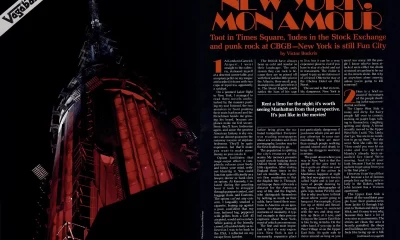Lifestyle
Why Travel Expert Rick Steves Thinks US Cannabis Reform ‘Just ‘Makes Sense’

Steves first began stumping for legalization in his home state of Washington. He has since pushed for legalization in various states.
Rick Steves is typically known for his travel expertise, but since 2012, he has also been a vocal proponent for adult use cannabis legalization. The host of “Rick Steves’ Europe” considers himself to be a different type of spokesperson — as opposed to, say, Snoop Dog or Tommy Chong — who can take the fear out of cannabis.
“I realized I’ve got something to offer because I’m a businessman, I’m a leader in my church and I’m not a counterculture kind of person,” Steves told Benzinga. Bringing what he considers a European sensibility to the discussion, Steves believes harm reduction is the way, not incarceration.
Steves pointed towards the ill effects of opioids and the ongoing drug war, from disproportionate arrest rates to the cost of policing, all playing a factor. “I think it just makes more sense to take the crime out of the equation and talk about it in terms of education and health,” he said.
Smarter Laws
Steves first began stumping for legalization in his home state of Washington. He has since pushed for legalization in various states.
This time around, the NORML board member is lending his voice to Arizona and New Jersey. He chose the two states on the same criteria he does every election cycle. “Every two years, I get on board to support laws that I would consider public health laws,” Steves said.
Factors in his decision include road safety, employee rights, and respecting citizens’ wishes who prefer not to take part, among others.
“Every year, we get smarter at how we do legalization,” he said. Unlike European markets, such as the Netherlands, where distribution and wholesale laws remain in a gray area, states have often done their part to create regulations that address the illicit market and provide tax revenue to the community.
Steves credited such laws for creating a lucrative marketplace where operators strive to remain compliant and carefully managed.
The key to keeping the illicit market in check is to ensure that taxes and other prices are never too high in the legal space, an issue that several states contend with, he explained.

While some states continue to lag, Steves is pleased with the market’s progress overall, including in Washington State.
“The laws are getting smarter, and I’m proud of the work we’re doing,” he said.
Next Steps
Legislative activity is taking shape on the state and national level, including the recent punting of the MORE Act vote until the post-election lame-duck session.
Politicians tend to be overly cautious, and fear the “soft on drugs” label, Steves says.
“I think they would rather not be on the record one way or another for something like the MORE Act before the election,” he said.
Nevertheless, Steves says momentum is in cannabis’ favor. With growing public support and increasing state revenues, he does not see lawmakers being able to backpedal on the issue much longer.
“We’re at the tipping point where now the federal government’s going to recognize it’s time for this prohibition to go,” Steves said.
Business
Alabama to make another attempt Dec. 1 to award medical cannabis licenses

Alabama regulators are targeting Dec. 1 to award the first batch of medical cannabis business licenses after the agency’s first two attempts were scrapped because of scoring errors and litigation.
The first licenses will be awarded to individual cultivators, delivery providers, processors, dispensaries and state testing labs, according to the Alabama Medical Cannabis Commission (AMCC).
Then, on Dec. 12, the AMCC will award licenses for vertically integrated operations, a designation set primarily for multistate operators.
Licenses are expected to be handed out 28 days after they have been awarded, so MMJ production could begin in early January, according to the Alabama Daily News.
That means MMJ products could be available for patients around early March, an AMCC spokesperson told the media outlet.
Regulators initially awarded 21 business licenses in June, only to void them after applicants alleged inconsistencies with how the applications were scored.
Then, in August, the state awarded 24 different licenses – 19 went to June recipients – only to reverse themselves again and scratch those licenses after spurned applicants filed lawsuits.
A state judge dismissed a lawsuit filed by Chicago-based MSO Verano Holdings Corp., but another lawsuit is pending.
Source: https://mjbizdaily.com/alabama-plans-to-award-medical-cannabis-licenses-dec-1/
Business
Pot Odor Does Not Justify Probable Cause for Vehicle Searches, Minnesota Court Affirms

The Minnesota Supreme Court affirmed that cannabis odor does not constitute probable cause to search a vehicle.
If Minnesota police search a vehicle solely based upon the smell of pot, they can’t justify searching a vehicle, even if there is evidence found of other alleged crimes. Even after appealing a lower court decision to suppress the evidence—twice—the Minnesota Supreme Court agreed, and the dismissal of his charges stands.
In a ruling filed regarding a case the State of Minnesota Court of Appeals on Sept. 13, the Minnesota Supreme Court affirmed that cannabis odor does not constitute probable cause to search a vehicle.
The case has been ongoing for two years. On July 5, 2021, just before 10 p.m., a Litchfield police officer stopped a car for an obscure local law: the light bar mounted on the vehicle’s grill had more auxiliary driving lights than are permitted under Minnesota law. The officer asked the driver, Adam Lloyd Torgerson, for his license and registration. Torgerson, his wife, and his child were present in the vehicle. The officer stated that he smelled pot and asked Torgerson if there was any reason for the odor, which he initially denied. But cops found a lot more than just pot.
A backup officer was called in. The couple denied possessing any pot, but Torgerson admitted to smoking weed in the past. The second officer stated that the weed odor gave them probable cause to search the vehicle and ordered them to exit the vehicle. The first officer searched the vehicle and found a film canister, three pipes, and a small plastic bag in the center console. The plastic bag contained a white powder and the film canister contained meth, which was confirmed in a field test.
Torgenson was charged with possession of meth pipe in the presence of a minor and fifth-degree possession of a controlled substance after the unwarranted search of Torgerson’s vehicle.
Police Aren’t Allowed to Do That, Multiple Courts Rule
But the search had one major problem—cops weren’t searching for a meth pipe. They only searched his car because they could smell pot, and the meth and paraphernalia were a surprise for everyone. Still, they had no grounds to search the vehicle. The man’s charges were later dismissed after the district court determined the odor of cannabis alone was insufficient basis for probable cause to search the vehicle, regardless of whatever other drug paraphernalia they found.
The state appealed the case, but the Minnesota Court of Appeals affirmed the district court’s decision. The case was appealed a second time, this time to the Minnesota Supreme Court, which agreed with the lower court’s ruling.
“This search was justified only by the odor of marijuana emanating from the vehicle,” the Minnesota Supreme Court decision reads. “Torgerson moved to suppress the evidence found during the search, arguing that the odor of marijuana, alone, is insufficient to create the requisite probable cause to search a vehicle under the automobile exception to the warrant requirement. The district court granted Torgerson’s motion, suppressed the evidence, and dismissed the complaint. The State appealed. The court of appeals affirmed the district court’s suppression order. Because we conclude that the odor of marijuana emanating from a vehicle, alone, is insufficient to create the requisite probable cause to search a vehicle under the automobile exception to the warrant requirement, we affirm.”
It amounts to basic human rights that apply—regardless of whether or not a person is addicted to drugs.
Other States do Precisely the Same Regarding Pot Odor as Probably Cause
An Illinois judge ruled in 2021 that the odor of cannabis is not sufficient grounds for police to search a vehicle without a warrant during a traffic stop.
Daniel J. Dalton, Associate Judge of the 14th Judicial Circuit, issued a ruling in response to a motion to suppress evidence in the case of Vincent Molina, a medical cannabis patient arrested for cannabis possession last year.
In that case, Molina was arrested despite the decriminalization of small amounts of cannabis in Illinois in 2019 with the passage of the Illinois Cannabis Regulation and Tax Act.
In some states, the issue of probable cause and cannabis was defined through bills.
Last April, the Maryland House of Delegates approved a bill that reduces the penalties for public cannabis consumption and bars police from using the odor of cannabis as the basis for the search of an individual or auto. Under Maryland’s House Bill 1071, law enforcement officers would be prohibited from using the odor of raw or burnt cannabis as probable cause to search a person or vehicle.
The rulings represent the rights of citizens when they are pulled over by police, even if there are hard drugs involved.
Business
Can Cannabis Help Seasonal Depression

Ultimately, seasonal affective disorder can set in as quickly and seamlessly as the fall foliage on the trees outside.
The weather and foliage on the trees aren’t the only things that are changing around this time of year. As the sun starts to set earlier and earlier, peoples moods can be affected by the decrease in sunlight. This is often known as seasonal affective disorder (SAD), and it can make the winter months miserable for lots of people. Can cannabis help seasonal depression?
Fortunately for those that do suffer from SAD, there are numerous remedies that can make this time of year more bearable. Exercise, vitamin supplements and even marijuana can have an enormous impact on fighting against the disorder. While there are resources for offsetting the disorder, getting a full understanding of the problem is paramount in being able to overcome it.

Seasonal Affective Disorder Symptoms
One of the most crucial steps in combating SAD is properly identifying its symptoms. Some of those symptoms include:
- Anxiety
- Social withdrawal
- Sleepiness and fatigue
- Weight gain
- Suicidal thoughts
- And several others
Those who are suffering from any of these symptoms should refrain from self-diagnosis and seek professional assistance. That professional assistance could lead to more resources to fight the disorder such as an antidepressant prescription.
How Common is Seasonal Affective Disorder?
In recent years, more and more people who suffer from seasonal affective disorder have begun opening up about their struggles. An estimated 10 million Americans are said to be currently dealing from SAD. Additional research shows women are four times more likely to be diagnosed with the disorder than men. SAD also appears to be more prevalent among people with pre-existing mental health conditions like bipolar disorder.
The number of people across the globe who suffer from seasonal depression is slightly lower than that of the United States. Only about 1-2% of the global population is said to suffer from seasonal depression while about 5% of the U.S population suffers from SAD.

How to Fight Seasonal Affective Disorder
There are a number of proven ways to offset some of the sadness that comes with the changing of the seasons. For example, cannabis contains cannabinoids that can have a positive impact on mood, while potentially increasing serotonin levels. When it comes to decreasing anxiety levels, that’s where CBD comes into play. By working with our body’s endocannabinoid system, CBD has been seen as instrumental in boosting dopamine levels.
Aside from cannabis, there are a handful of other at-home methods that can help alleviate the symptoms of seasonal affective disorder. Spending more time with friends, family and loved ones can be highly effective in offsetting some SAD symptoms. The same can be said for making an effort to get lots of sunlight and getting regular exercise.
Ultimately, seasonal affective disorder can set in as quickly and seamlessly as the fall foliage on the trees outside. Knowing that you aren’t alone, and having the best practices for fighting it, can make the fall and winter months better than you could have ever imagined.
Source: https://thefreshtoast.com/medical-marijuana/can-cannabis-help-seasonal-depression/
-

 Business2 years ago
Business2 years agoPot Odor Does Not Justify Probable Cause for Vehicle Searches, Minnesota Court Affirms
-

 Business2 years ago
Business2 years agoNew Mexico cannabis operator fined, loses license for alleged BioTrack fraud
-

 Business2 years ago
Business2 years agoAlabama to make another attempt Dec. 1 to award medical cannabis licenses
-

 Business2 years ago
Business2 years agoWashington State Pays Out $9.4 Million in Refunds Relating to Drug Convictions
-

 Business2 years ago
Business2 years agoMarijuana companies suing US attorney general in federal prohibition challenge
-

 Business2 years ago
Business2 years agoLegal Marijuana Handed A Nothing Burger From NY State
-

 Business2 years ago
Business2 years agoCan Cannabis Help Seasonal Depression
-

 Blogs2 years ago
Blogs2 years agoCannabis Art Is Flourishing On Etsy













